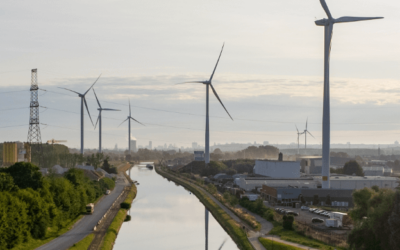In Europe, 75% of the buildings are energy inefficient and most of them are in the commercial rented sector. The SmartSPIN project has a solution that can change this. Its business model addresses the key market barriers that prevent landlords and tenants from implementing smart energy and flexibility services in their commercial buildings. EGEN is a partner in this innovative project.
Energy inefficiency throughout Europe
In Europe, buildings account for 40% of energy consumption and 36% of the generated carbon emissions. According to the latest studies, 75% of all buildings in the European Union are energy inefficient, and only 1% of them are renovated each year. In addition, around 25% of Europe’s buildings are non-residential buildings, which are often owned by a commercial landlord who rents and/or leases all or just parts of the building to one or more tenants.
In this context, one of the key market barriers to energy efficient building renovations is the split incentive problem, where the benefits of energy efficiency investment do not accrue to the actor who pays for the investment. In rented buildings this issue arises between tenants and landlords.
An innovative business model for integrating smart energy services
Introducing a new way of sharing costs and benefits between the involved parties, the SmartSPIN project aims at removing the current market barriers for integrating smart energy efficiency services in the commercial rented sector. After defining the service, practical experience with it will be gained through test demonstrations and data analysis of three real case studies in Spain, Greece, and Ireland – exploring how smart energy services can be deployed as an effective business model practice in Europe.
The SmartSPIN project started on 1 September 2021 and will run for three years until 31 August 2024. Funding has been provided by the European Union under the Horizon 2020 Research and Innovation programme.
Triggering investments in sustainable energy
SmartSPIN is expected to generate unique know-how, providing clear positive business and societal impacts. By using the project methodology, the three pilot sites are expected to generate 4.53 GWh/year energy savings through the improvement of the existing building systems and installations of solar photovoltaics. These energy savings will result in reduced greenhouse gas emissions of 941 tCO2eq/year. Additionally, SmartSPIN is expected to trigger investments in sustainable energy worth 8.27 million euros.
Above all, the project will create a more reliable and verifiable innovative energy service, and will demonstrate the trustworthiness and accessibility of service providers.
A dedicated project consortium
The SmartSPIN project is run by a consortium of seven partners from four European countries (Ireland, Greece, Spain and the Netherlands). The partners represent leading business, technological and research organisations across Europe. The International Energy Research Centre (IERC, located in Cork, Ireland) will oversee the project’s implementation plan of seven Work Packages.
EGEN is one of the seven partners in the SmartSPIN project. We are in charge of all Communication, Dissemination, Engagement and Exploitation activities, matching the project results with market opportunities and making the project’s work widely known. Our experts will promote the project results to a variety of stakeholders and ensure uptake of the SmartSPIN business model and toolkit by the market and decision makers.
Strategic collaboration with other European projects
In July 2022, SmartSPIN joined forces with two other Horizon 2020 funded projects: NEON and V2Market. NEON focuses on next-generation integrated energy services for Citizen Energy Communities (CEC’s). V2Market is an innovative service to incorporate EV batteries into the electricity system as storage and flexibility capacity, using Vehicle-to-Grid (V2G) and Vehicle-to-Building (V2B) technology. The three projects will be working closely together to design new approaches and business models to enhance energy efficiency and flexibility across Europe.


